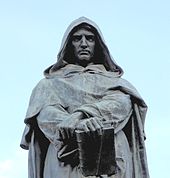使用者:-Zest/妹妹/本居小鈴

—— 本傑明·富蘭克林,1722 年。
思想自由(英語:Freedom of thought)又稱觀念自由,是個人持有或主張獨立於他人之事實、觀點或思想的自由權,例如不同於家長,宗教組織,與執政黨的思想。思想自由是人權的基本組成部分。需要注意的是,思想自由與言論自由不同,不應混淆。
總論[編輯]
| |||||||||||||||||
思想自由是其他的自由的先決條件,並與它們密切相關,這包括了信仰自由和言論自由。儘管Template:HowtoTranslate例如,美國權利法案的憲法第一修正案中,作出了著名的明確保障,規定法律不得干涉宗教,「或阻礙宗教的自由實踐」。美國最高法院大法官Benjamin Cardozo在Palko v. Connecticut一案(1937)中論述道:
思想自由……是其他任何形式自由的基石,是不可或缺的條件。對這一真理的普遍認識,可以追溯到我們的歷史、政治和法律中,除了極少數時遭到過的扭曲之外。
思想自由也是國際人權法中的重要部分。例如,在《公民及政治權利國際公約》的法律基礎《世界人權宣言》中,將思想自由名列第十八條:
人人有思想、良心和宗教自由的權利;此項權利包括改變他的宗教或信仰的自由,以及單獨或集體、公開或秘密地以教義、實踐、禮拜和戒律表示他的宗教或信仰的自由。
聯合國人權委員會認為, "distinguishes the freedom of thought, conscience, religion or belief from the freedom to manifest religion or belief. It does not permit any limitations whatsoever on the freedom of thought and conscience or on the freedom to have or adopt a religion or belief of one's choice. 這些自由是無條件受保護的。".[2] 世界人權宣言的第十九條也有類似的規定,」人人有權享有主張和發表意見的自由;此項權利包括持有主張而不受干涉的自由,和通過任何媒介和不論國界尋求、接受和傳遞消息和思想的自由。」
History of development and suppression[編輯]
因為明確知道他人心中在想什麼是不可能的,因此對思想自由的壓制是很困難的。思想自由的概念可以追溯到《聖經》,特別是聖保羅的寫作中(如《哥林多前書》10:29:「我這自由,為什麼要被別人的良心論斷呢? 」)。[3]

儘管希臘哲學家柏拉圖和蘇格拉底在有限程度上討論了思想自由,the edicts of King Ashoka (3rd century BC) have been called the first decree respecting Freedom of Conscience.[4] In European tradition, aside from the decree of religious toleration by Constantine I at Milan in 313, the philosophers Themistius, Michel de Montaigne, Baruch Spinoza, Locke, Voltaire, Alexandre Vinet, and John Stuart Mill have been considered major proponents of the idea of Freedom of Conscience.[5]
Queen Elizabeth I revoked a thought censorship law in the late sixteenth century, because, according to Sir Francis Bacon, she did "not [like] to make windows into men's souls and secret thoughts".[6] During her reign, philosopher, mathematician, astrologer, and astronomer Giordano Bruno took refuge in England from the Italian Inquisition, where he published a number of his books regarding an infinite universe and other topics banned by the Catholic Church. After leaving the safety of England, Bruno was eventually burned as a heretic in Rome for refusing to recant his ideas. For this reason he is considered by some to be a martyr for free thought.[7]
然而,思想自由可以通過審查制度、逮捕、焚書和政治宣傳加以限制, and this tends to discourage freedom of thought. Examples of effective campaigns against freedom of expression are the Soviet suppression of genetics research in favor of a theory known as Lysenkoism, the book-burning campaigns of Nazi Germany, the radical anti-intellectualism enforced in Cambodia under Pol Pot, the strict limits on freedom of expression imposed by the Communist governments of the Peoples Republic of China and Cuba or by right-wing authoritarian dictatorships such as those of Augusto Pinochet in Chile and Francisco Franco in Spain.
Freedom of expression can also be stifled without institutional interference when majority views become so widely accepted that the entire culture represses dissenting views. For this reason, some condemn political correctness as a form of limiting freedom of thought. Although political correctness aims to give minority views equal representation, the majority view itself can be politically correct; for example, college student Max Karson was arrested following the Virginia Tech shootings for politically incorrect comments that authorities saw as "sympathetic to the killer". Karson's arrest raised important questions regarding freedom of thought and whether or not it applies in times of tragedy.
薩丕爾-沃爾夫猜想則認為,思想自由鑲嵌在語言本身之中,因此認為任何試圖限制語言使用的行為,事實上是在限制思想自由。在喬治·奧威爾的《1984》中就體現了此見解,作者在書中描述了一種名為「新話」的精簡版英語,在這種語言裡缺少隱喻,而且對思想的表達起到了限制作用。
參考文獻[編輯]
 公民權利和政治權利國際公約. 維基文庫 (中文).
公民權利和政治權利國際公約. 維基文庫 (中文).- 《思想自由史》,[英]J.B.Bury 著,宋桂煌 譯,吉林人民出版社,1999年12月。
| |||||||||||||||||||||||||||
| 這是一篇與法律相關的小作品。你可以透過編輯或修訂擴充其內容。 |
- ^ Palko v. State of Connecticut, 302 U.S. 319 .
- ^ General Comment No. 22: The right to freedom of thought, conscience and religion (Art. 18) : . 30/07/93. CCPR/C/21/Rev.1/Add.4, General Comment No. 22. (General Comments). United Nations Human Rights Website - Treaty Bodies Database. Office of the United Nations High Commissioner for Human Rights. 1993-07-30 [2007-10-21].
- ^ Eugene J. Cooper, "Man's Basic Freedom and Freedom of Conscience in the Bible : Reflections on 1 Corinthians 8-10", Irish Theological Quarterly Dec 1975
- ^ Luigi Luzzatti, "The First Decree on Freedom of Conscience" p. 47 in God in Freedom. [15 September 2014].
- ^ Luzzatti, p. 91.
- ^ Brimacombe, Peter. All the Queen's Men: The World of Elizabeth I. Palgrave Macmillan. 2000: 125. ISBN 0-312-23251-9.
- ^ Arturo Labriola, Giordano Bruno: Martyrs of free thought no. 1
